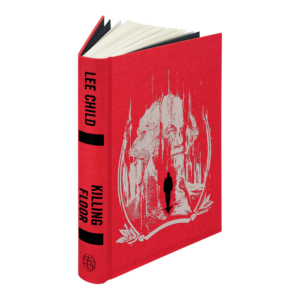Please indulge me while I digress on the subject of my grand unified theory of detective/mystery/thriller fiction. It will all relate back to Lee Child in the end, I promise.
There are, structurally, four essential narratives in this genre. The first is the Western. In the Western, our hero comes to a world without justice or law, and establishes order. Gary Cooper rides into the chaos of a dusty town and single-handedly subdues the bad guys.
Then there’s the Eastern. In the Eastern, our hero works to improve and educate the institutions of law and order in a world where they are incompetent. The Sherlock Holmes stories are all Easterns: Scotland Yard is hapless, unimaginative. Inspector Lestrade and his colleagues dutifully follow rules and procedures. Agatha Christie wrote Easterns as well. What does it say for the English attitude towards authority that they were so willing to believe that a moustachioed Belgian and an elderly spinster from St Mary Mead could outperform their officers of the law? (The Eastern, curiously, is the only one of the four thriller paradigms where the criminal himself is a bit player: the Eastern’s narrative emphasis is entirely on the game of wits between our heroic protagonist and the brain-dead institutions of authority.)
Third is the Southern, where our hero restores order to a world that is hopelessly corrupt. John Grisham’s novels are all Southerns. The protagonist in Grisham’s books is an outsider, a lawyer of scruple and conviction. The villains are all hopelessly crooked and venal insiders: representatives of corporate and political authority. Who is the winner in a Grisham book? The law.
Finally, there is the Northern, in which our hero works to perpetuate order from within a functional system. The popular television show Law & Order is a classic Northern. The prosecutors are hard-working and honest. The police are dogged. By the end, the villain is always behind bars. Virtually all Scandinavian crime fiction—which has recently and deservedly risen to such prominence—is Northern. How could it not be? There is little room in the orderly, rational universe of Scandinavian pragmatism for crooked cops and corrupt judges. (It has been a long time since anything was rotten in the state of Denmark.)
You may not have realized this, but when you peruse the row of paperbacks in the airport bookshop, you are choosing among these four very different existential fantasies.You may not have realized this, but when you peruse the row of paperbacks in the airport bookshop, you are choosing among these four very different existential fantasies. Do you wish, on your flight, to join the hero in establishing, improving, restoring or perpetuating order? Over the years I have made a habit of glancing around the cabin and classifying my fellow passengers accordingly. Oh, there is the businessman with his Jo Nesbo, seeking the reassurance of Nordic institutional stability. There is the pensioner with her Agatha Christie, quietly rejoicing in Miss Marple’s triumph over the local constabulary. Me? I’m reading Lee Child. And what is the Reacher series, in this paradigm? Well, that is the special joy of reading Killing Floor. Because here, in his first foray into the genre, we have the pleasure of seeing Lee Child work his way towards an answer. We begin with a slightly sinister small town in Georgia. Reacher arrives, as he always does, by accident. He’s on a bus from somewhere in Florida to Atlanta, and decides to hop off. He walks into a town along the highway. The town is nice. Too nice. And sure enough, we quickly learn, the police department is not what it seems. It’s like something out of a Grisham novel. We are, we think, in Southern territory.
But wait. Are we? Reacher is a drifter, a man without attachment or loyalties. He does not seek to restore the institutions of order. He is the order. Just Reacher, all six foot five of him. He wants to kick the corrupt guy in the larynx. Lee Child feints towards the Southern, and then heads due West.
And what happens when the bad guys are all dead? If this were a Southern, Reacher would stay and become mayor. In an Eastern, he would set up shop down the street from the police station, as a private investigator, there to humiliate the town detectives when the next murder occurs. In a Northern, there would be a formal criminal inquiry into his conduct inside Warburton prison. Were Lee Child Norwegian, Reacher would end up in a rehabilitation facility outside Trondheim, looking into his soul and finding bottomless fjords of remorse. But this is a Western. Reacher confronts his feelings, finds nothing at all, and hops on the next bus out of town. As you will discover if you read on in the Reacher series—and let me tell you that you are a fool if you do not—there are many, many other towns in America in need of his services.
—Lee Child’s Killing Floor introduced by Malcolm Gladwell and illustrated by Oliver Barrett is available exclusively from The Folio Society (www.foliosociety.com).


















